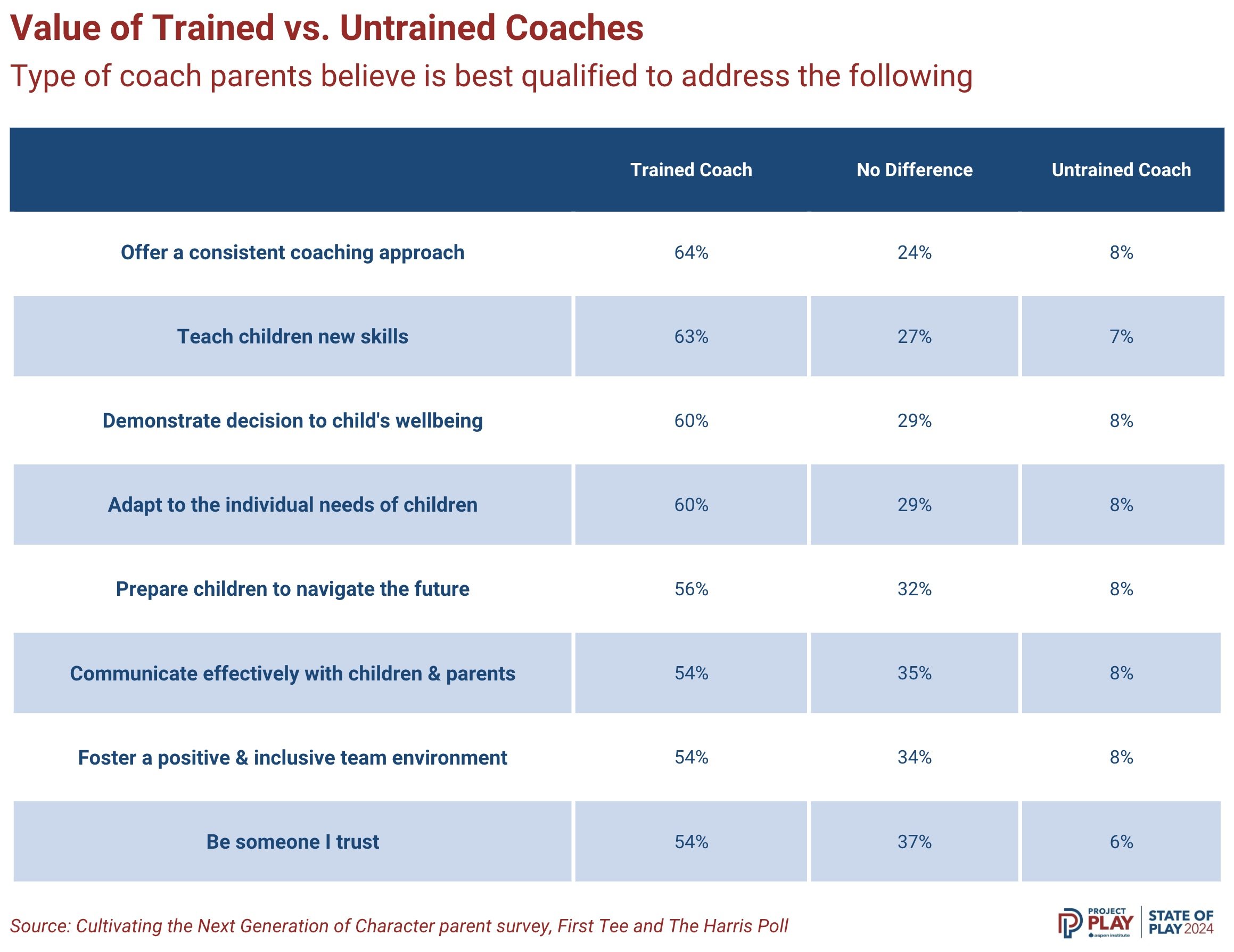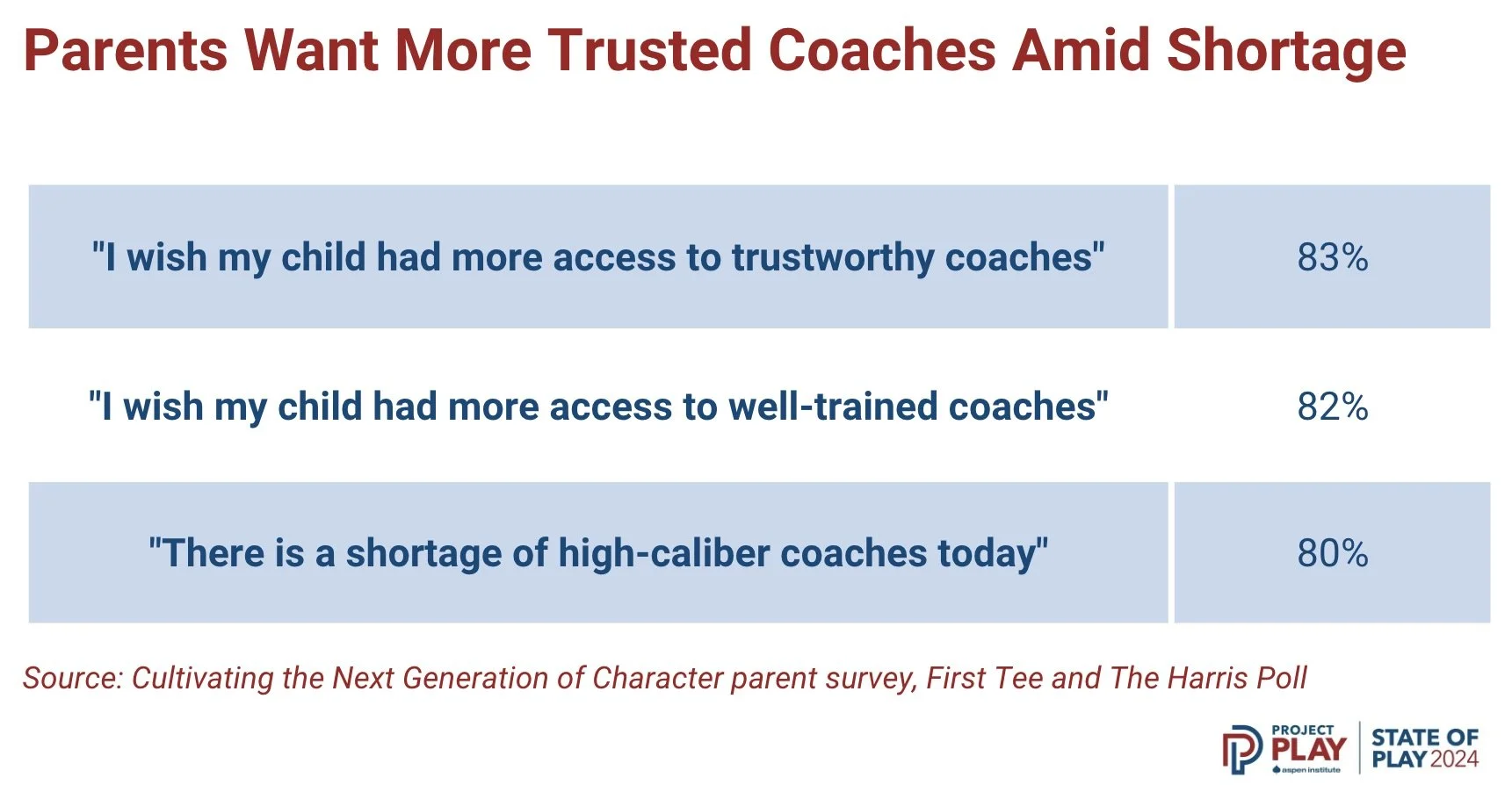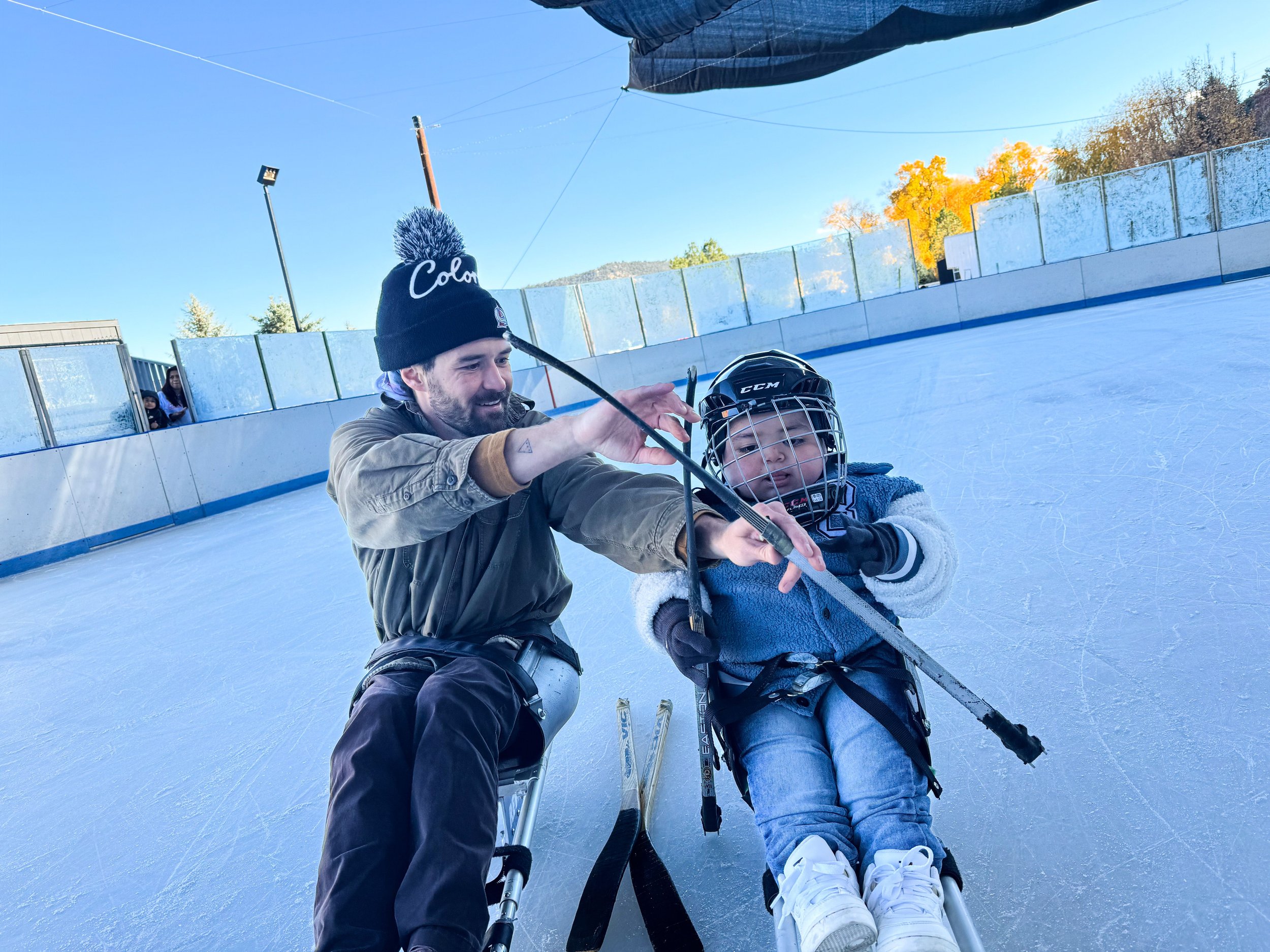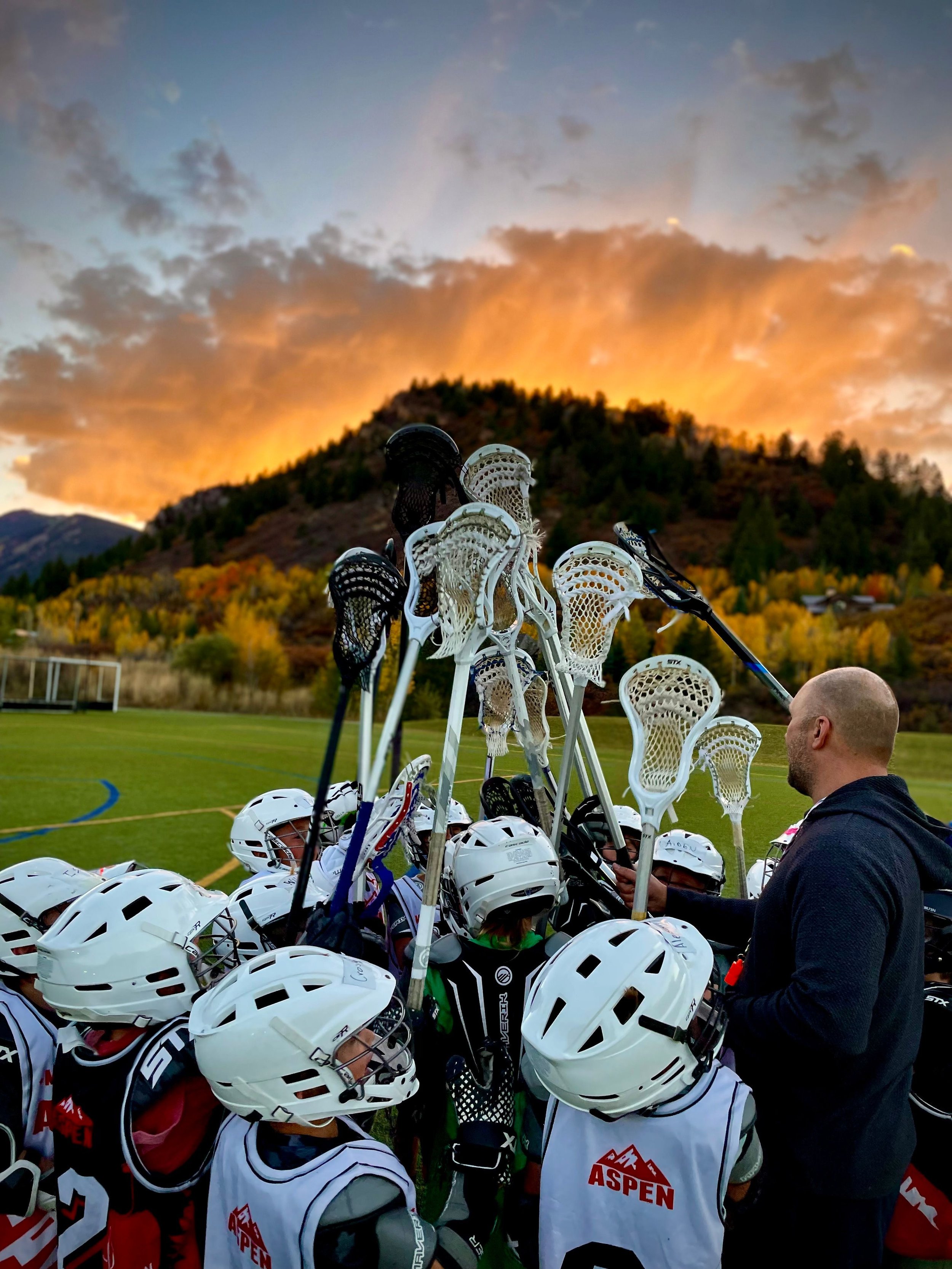Coaching Trends
The value of good coaches is clear. Parents want trustworthy and trained coaches. More coaches report being trained at least once in their lives, but they’re being trained less frequently than before the pandemic. With fewer people willing to help coach, older coaches have returned to offer support. The trends below come from the Aspen Institute’s State of Play 2024 report, courtesy of interviews conducted with leaders in the youth sports space, data analyzed by the Project Play team, or articles and research produced by other entities.
Top 5 Coaching Trends
1
Parents value trustworthy and trained coaches. More than half of surveyed parents say that a trustworthy coach would increase their enthusiasm to commit their child long-term to the activity, recommend the activity to other parents, and enroll their child in more activities. This was a key takeaway from a new report, “Cultivating the Next Generation of Character,” through a survey by First Tee and The Harris Poll. As the Aspen Institute and others embark on our 63X30 quest to help the nation lift youth sports participation to 63% by 2030, this finding reflects the connection between quality coaching and parent decisions around participation.
A higher percentage of Gen X parents (41%) — adults currently between the ages of 44 and 59 — would prioritize their child’s activity over other options if there was a trustworthy sports coach. And 34% of Gen X parents would pay a premium for trustworthy coaches, also a higher rate than other parents.
The report also shows parents’ beliefs in the quality and readiness of trained vs. untrained coaches. About 6 in 10 surveyed believe that trained coaches are better qualified to address several important areas associated with their child’s sports experience, such as offering a consistent coaching approach, teaching new skills, adapting to the individual needs of children, and demonstrating dedication to child wellbeing.
Not surprisingly, 80% of surveyed parents believe there is a shortage of high-caliber coaches. This number aligns exactly with the views of coaches themselves as the National Coach Survey previously found that 80% of coaches believe that their community needs more coaches.
Also, safety is critically important to parents, with 94% citing their preference for background checks of coaches and 83% wishing their child had more access to well-trained coaches.
94%
Parents who prefer background checks for coaches
2
California aims to train 25,000 coaches in positive youth coaching by 2025. California Gov. Gavin Newsom’s Advisory Council on Physical Fitness and Mental Wellbeing is partnering with the Susan Crown Exchange’s Million Coaches Challenge (MCC) to launch a statewide effort to instill the principles of positive youth development and culturally responsive coaching. The Positive Coaching Alliance and Center for Healing and Justice through Sports will deliver the training through parks and recreation systems, schools, community-based organizations and club teams. The governor’s council will promote the initiative, reaching communities with significant need and underrepresentation in youth sports.
“Sports are a hugely important tool for helping kids develop teamwork, confidence, and physical and mental health, while also meeting strong role models in their coaches,” Newsom said. “As leaders, we have an obligation to make sure those coaches have the tools to meet that high bar.”
Positive role modeling was the top quality that parents prioritize for their child’s coaches, according to separate research in the survey by First Tee and The Harris Poll.
“California is setting a powerful example for the country,” said Kevin Connors, managing director of the Susan Crown Exchange. “This initiative will help ensure that hundreds of thousands of young athletes experience sports in ways that promote physical, emotional and mental well-being.”
The Million Coaches Challenge produced an impact report on the power and possibility of coach training. Among the findings: 88% of coaches agree that participation in training made them a better coach.
88%
Coaches who agree that participation in training made them a better coach
3
Older citizens have returned to help coach children. For about a decade and through the pandemic, adults ages 55 and older comprised a small portion of youth sports head coaches (about 14% to 20% of those who coach children ages 6-14). That’s changing. In two of the past three years, SFIA data shows this age group accounted for more than one-third of the coaches (37% in 2021 and 40% in 2023). The year in-between (2022) was a curious outlier at 19% of coaches who were 55 and older.
During COVID, many older people left coaching. Some of it was due to sports shutdowns. Some of it was fear of getting sick. Some if it was being tired of abuse by parents. Teams were running out of coaches – and officials too.
“In the last year, everybody in the youth sports community has been saying, ‘We need your help as coaches and officials, please come back,’” said Tom Cove, SFIA senior advisor and former president/CEO. “You have a group of people, myself included, who retired and want to give back. We’ve also seen people say, ‘Pay me more and I’ll come back.’”
The rise in older volunteers coincides with declines in formal volunteerism generally and changing views among young people how to serve their communities, which could include serving as coaches. In a report by the All State Foundation, youth ages 18-25 were asked to clarify what types of behaviors were an example of service. Answers included working with others to make their campus or community a better place (82%) and everyday acts of kindness (76%).
SFIA data shows that fewer coaches are coming from the highest-income households. In 2016, half of the coaches were from homes making $100,000 or more; in 2023, 36% came from that income bracket. In recent years, more coaches live in homes making under $50,000.
Interestingly, while anecdotally we hear that it’s very hard to find coaches, the number of current coaches in 2023 (8.1 million) was much higher than it was in 2018 (5.5 million).
Note: “Former Coaches” refer to those who self-identify as formerly being involved in coaching a youth sports team (ages 14 and under) in the past five years. “Current Coaches” are those who identified as currently being a head coach or assistant at the time of the survey.
Source: Sports & Fitness Industry Association
"On the surface, a rise in former coaches means a growing number of people who have stopped coaching. That's troubling,” said Vincent Minjares, who leads Project Play’s coaching portfolios. “Anecdotally, many communities around the country tell us of their coaching shortages, particularly among women and historically underserved populations. While recruitment remains key, this data reinforces the importance of coach retention, and the need to understand and foster quality experiences in coaching.”
4
More coaches have been trained at least once, but trainings are less frequent. Some good news: Far more coaches say they have been trained at least one time in their life in the key competencies tracked annually by SFIA – CPR/basic first aid, concussion management, general safety and injury prevention, physical conditioning, sports skills and tactics, and effective motivational techniques. Between 83% and 90% of coaches surveyed in 2023 indicated being trained at least once in their life. In 2018, between 51% and 66% of coaches said yes to this question.
At the same time, a lower percentage of current coaches in 2023 reported having received training in the last 12 months compared to a one-year period in 2019. For instance, 29% of coaches in 2023 reported recent training in injury prevention, down from 34% in 2019.
It’s important to note that coach training rates don’t account for the quality of the instruction and whether it makes a difference. Behavior change comes from a feedback loop and the coaching field generally lacks accountability and people consistently coaching the coaches.
The past year also saw many states take action to ensure coaches are trained sudden cardiac arrest and require that automatic external defibrillators be placed in every school and sports recreation venues. Buffalo Bills football player Damar Hamlin, who nearly died on the field during an NFL game, has advocated for these changes in many states.
5
States increasingly recognize the value of mental health trainings for coaches. In 2024, seven high school state athletic associations required training for school-based coaches in mental health, according to Mapping of School-Based Coach Education and Training Requirements in the United States, a policy brief produced by Million Coaches Challenge. The states include Alabama, Colorado, Idaho, Minnesota, Ohio, Rhode Island and Washington.
Maryland joined Ohio in 2024 with a state law requiring that public high school coaches get trained to recognize mental illness and behavioral stress in students. That includes recognizing signs of depression, trauma, violence, youth suicide and substance abuse. Maryland went a step farther than Ohio by requiring all public colleges to also provide this training to coaches.
Pennsylvania is considering a bill that would make mental health training mandatory for high school sports coaches. The bill would require the Pennsylvania Department of Health and Department of Education to review mental health resources and create a curriculum for school officials. It would also require schools to notify students and their parents, athletic staff and extracurricular advisers of available mental health services twice each school year.
State Rep. Jesse Topper (R-Bedford), an opponent of the measure, said that while a mental health crisis exists among students, a mandate that coaches go through training would be redundant, according to the Pennsylvania Capital-Star. “I think something that we always have to be careful of is adding more requirements when we already have shortages of coaches, of teachers, counselors,” said Topper, a longtime high school football coach. “These are people who are already very invested in the mental health and well-being of their students and student-athletes.”
Several high school athletes and coaches in Pennsylvania spoke about the need for these trainings. “It’s very often that I know things before those kids’ parents do because they don’t want to tell mom and dad, but they will tell coach,” Susquehannock High School baseball coach Kevin Lawrence said.
In a 2022 national survey of coaches, the Aspen Institute and Ohio State found that only 18% of youth coaches feel highly confident in their ability to link athletes to mental health resources. But 67% of the coaches want more education on the subject.
Research Sources
Parent Survey by First Tee and The Harris Poll
The survey explored parent perceptions of extracurricular, including sports, on youth development. The Harris Poll surveyed 2,082 U.S. adults online in March 2023, including 542 parents of children under the age of 18. The survey captured data on youth’s involvement in extracurricular activities, including those who are currently involved (393) and those who are involved in sports (256). Data was analyzed by gender, age, race, education, income and other characteristics. Learn more by reading the report.
Sports & Fitness Industry Association (SFIA)
SFIA commissioned an online, nationally representative survey from Sports Marketing Surveys (SMS) that the Aspen Institute annually uses to track sports participation rates and coach training data. In 2023, the most recent year with available data, SMS conducted 18,000 online interviews with a national sample of individuals from U.S. proprietary online panels representative of the U.S. population of people ages 6 and older. Strict quotas associated with gender, age, income, region and ethnicity were followed to ensure a balanced sample. Activity reporting is based on a rolling 12-month participation rate.














